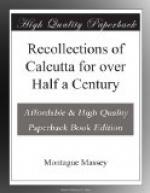By the provisions of this Bill, it was enacted that any native magistrate of a certain status should be empowered to try criminally, European-born subjects, I have never seen or heard such a storm of seething rage and indignation as then swept through the length and breadth of the land and which at one time threatened serious consequences. Fortunately at the head of the European non-official community we had in the person of Mr. Keswick, senior partner in Jardine Skinner & Co., then the premier firm in Calcutta, a man of undoubted ability and most forcible and independent character, who fought the battle against the Government in a most masterly manner. I think that it was due in a great measure to him that several members of the Government were won over to our side, notably Sir Rivers Thompson, then Lieutenant-Governor of Bengal, who was seriously ill at the time, but rose up from a sick-bed to attend the Council and speak and vote against the Bill; also Mr. Thomas, lately deceased, the member for Madras, who cast aside all personal considerations of future advancement to enter an able and strong protest against this most iniquitous measure. I remember it was in contemplation to hold a monster meeting on the maidan in the big tent of Wilson’s Circus which then happened to be in Calcutta, but in the meantime it was announced that wiser counsels had prevailed, and Lord Ripon had reluctantly climbed down, I believe, after most strenuous persuasion, and had consented to a compromise by agreeing to the introduction of a clause in the Bill conferring the right of option on European-born subjects electing to be tried or not by a native magistrate. Thus ended the most sensational and exciting controversy Calcutta has ever experienced, and one which, unfortunately, struck a note of discord between the European and Indian communities, the effects of which are still apparent, and in a measure marred that feeling of kindliness and mutual trust and good-will that formerly existed between the two races.
A MUCH-CHANGED CITY.
As for the appearance of Calcutta half a century and more ago, it was very different to what it is now, and there were, of course, none of the amenities of life which make the city a pleasant place to live in to-day, even in the hot weather and rains. There were no paved side-walks, the water supply came from tanks and wells, there were no electric lights or fans, and no telephone. The drainage system was of the crudest with open drains in many side streets. There were no “Mansions” or blocks of flats as there are now, and generally the city was a very different place to the Calcutta of to-day. The floods in the streets are pretty bad at the present time after a heavy monsoon storm, but nothing like what they were then, I remember going to office one morning after three days and nights of heavy rain, and at the cornet of Park and Free School Streets, where Park Mansions stand now, there was quite a lake from which as I was passing I was startled to see a tall form rise from the water. It was one of the masters of the Doveton College, who had taken his boys to bathe there, and the water must have been fully three or four feet deep!




